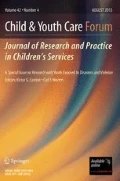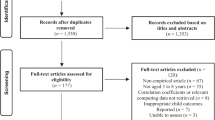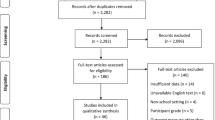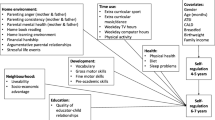Abstract
Background
Over the past few decades early self-regulation has been identified as foundational to positive learning and wellbeing trajectories. As a consequence, a wide range of approaches have been developed to capture children’s developmental progress in self-regulation. Little is known, however, about whether and which of these are reliable indicators of future ability and risk for young children.
Objective
This study examined measures from prominent approaches to self-regulation assessment (i.e., task-based, observation, adult-report) to determine: their structure; how these predict future academic school readiness in 3–5-year-old children, individually and if combined; and whether thresholds could be ascertained to reliably discriminate those children at risk of poor academic outcomes.
Methods
Longitudinal analyses were conducted on start-of-year self-regulation data from 217 children in the final year of pre-school, using three prominent approaches to self-regulation assessment, and their end-of-year school readiness data. Data were subjected to path analysis, structural equation modelling and receiver operating characteristic curve analyses.
Results
Start-of-year cognitive self-regulation indices—but not behavioral or emotional self-regulation indices—from each approach reliably predicted school readiness 7 months later, just prior to commencing school. Only when combined into a composite score was a threshold with sufficient sensitivity and specificity for predicting school readiness risk established; yet this provided better prediction of true-negative than true-positive cases.
Conclusions
Taken together, these results suggest the importance of cognitive self-regulation in particular for school readiness, as measured here, although self-regulation is just one of the contributing factors to school readiness risk.



Similar content being viewed by others
References
Australian Bureau of Statistics. (2008). Information paper: An introduction to socio-economic indexes for areas (SEIFA) (cat. no. 2039.0). Retrieved August 16 2016 from http://www.abs.gov.au/ausstats/abs@.nsf/mf/2039.0
Australian Curriculum and Assessment Reporting Authority (ACARA). (2017). Australian curriculum and assessment reporting authority. Retrieved from https://www.acara.edu.au/
Bailey, R., & Jones, S. M. (2019). An integrated model of regulation for applied settings. Clinical Child and Family Psychology Review, 22(1), 2–23. https://doi.org/10.1007/s10567-019-00288-y
Bierman, K. L., Nix, R. L., Greenberg, M. T., Blair, C., & Domitrovich, C. E. (2008). Executive functions and school readiness intervention: Impact, moderation, and mediation in the Head Start REDI program. Developmental Psychopathology, 20(3), 821–843. https://doi.org/10.1017/S0954579408000394
Blair, C. (2016). The development of executive functions and self-regulation: A bidirectional psychobiological model. In K. D. Vohs & R. F. Baumeister (Eds.), Handbook of self-regulation: Research, theory, and applications (3rd edn., pp. 417–439). Guilford.
Blair, C., & Raver, C. C. (2015). School readiness and self-regulation: A developmental psychobiological approach. Annual Review of Psychology, 66, 711–731. https://doi.org/10.1146/annurev-psych-010814-015221
Blair, C., Ursache, A., Greenberg, M., & Vernon-Feagans, L. (2015). Multiple aspects of self-regulation uniquely predict mathematics but not letter–word knowledge in the early elementary grades. Developmental Psychology, 51(4), 459–472. https://doi.org/10.1037/a0038813
Bollen, K., & Lennox, R. (1991). Conventional wisdom on measurement: A structural equation perspective. Psychological Bulletin, 110, 305–314. https://doi.org/10.1037/0033-2909.110.2.305
Bracken, B. A. (2007). Bracken school readiness assessment: Examiner’s manual (3rd ed.). Pearson.
Bronson, M. B., Tivnan, T., & Seppanen, P. S. (1995). Relations between teacher and classroom activity variables and the classroom behaviors of pre-kindergarten children in Chapter 1 funded programs. Journal of Applied Developmental Psychology, 16, 253–282. doi: https://doi.org/10.1016/0193-3973(95)90035-7
Browne, M. W., & Cudeck, R. (1993). Alternative ways of assessing model fit. In K. A. Bollen & J. S. Long (Eds.), Testing structural equation models (pp. 136–162). Sage.
Department for Education (DfE). (2017). The National Curriculum in England: Framework for key stages 1 to 4. Retrieved from https://www.gov.uk/government/publications/national-curriculum-in-england-framework-for-key-stages-1-to-4
Department of Education and Training (DET). (2009). Belonging, being & becoming—The early years learning framework for Australia. Retrieved from https://docs.education.gov.au/node/2632
Diamond, A., Lee, C., Senften, P., Lam, A., & Abbott, D. (2019). Randomized control trial of tools of the mind: Marked benefits to kindergarten children and their teachers. PLoS ONE, 14(9). https://doi.org/10.1371/journal.pone.0222447
Duckworth, A., & Kern, M. (2011). A meta-analysis of the convergent validity of self-control measures. Journal of Research in Personality, 45(3), 259–268. https://doi.org/10.1016/JRP.2011.02.004
Edossa, A. K., Schroeders, U., Weinert, S., & Artelt, C. (2018). The development of emotional and behavioral self-regulation and their effects on academic achievement in childhood. International Journal of Behavioral Development, 42(2), 192–202. https://doi.org/10.1177/0165025416687412
Finders, J. K., McClelland, M. M., Geldhof, G. J., Rothwell, D. W., & Hatfield, B. E. (2021). Explaining achievement gaps in kindergarten and third grade: The role of self-regulation and executive function skills. Early Childhood Research Quarterly, 54, 72–85. https://doi.org/10.1016/j.ecresq.2020.07.008
Gooch, D., Thompson, P., Nash, H. M., Snowling, M. J., & Hulme, C. (2016). The development of executive function and language skills in the early school years. Journal of Child Psychology and Psychiatry, 57(2), 180–187. https://doi.org/10.1111/jcpp.12458
Guhn, M., Gadermann, A. M., Almas, A., Schonert-Reichl, K. A., & Hertzman, C. (2016). Associations of teacher-rated social, emotional, and cognitive development in kindergarten to self-reported wellbeing, peer relations, and academic test scores in middle childhood. Early Childhood Research Quarterly, 35, 76–84. https://doi.org/10.1016/j.ecresq.2015.12.027
Heckman, J. (2006). Skill formation and the economics of investing in disadvantaged children. Science, 312, 1900–1902. https://doi.org/10.1126/science.1128898
Herndon, K. J., Bailey, C. S., Shewark, E. A., Denham, S. A., & Bassett, H. H. (2013). Preschoolers’ emotion expression and regulation: Relations with school adjustment. Journal of Genetic Psychology, 174(6), 642–663. https://doi.org/10.1080/00221325.2012.759525
Hofmann, W., Schmeichel, B. J., & Baddeley, A. D. (2012). Executive functions and self-regulation. Trends in Cognitive Sciences, 16, 174–180. https://doi.org/10.1016/j.tics.2012.01.006
Howard, S. J., & Melhuish, E. C. (2017). An Early Years Toolbox (EYT) for assessing early executive function, language, self-regulation, and social development: Validity, reliability, and preliminary norms. Journal of Psychoeducational Assessment, 35(3), 255–275. https://doi.org/10.1177/0734282916633009
Howard, S. J., Neilsen-Hewett, C., de Rosnay, M., Vasseleu, E., & Melhuish, E. C. (2019). Evaluating the viability of a structured observational approach to assessing early self-regulation. Early Childhood Research Quarterly, 48(3), 186–197.
Howard, S. J., & Vasseleu, E. (2020). Self-regulation and executive function longitudinally predict advanced learning in preschool. Frontiers in Psychology, 11, 49. https://doi.org/10.3389/fpsyg.2020.00049
Howard, S. J., & Williams, K. E. (2018). Early self-regulation, early self-regulatory change, and their longitudinal relations to adolescents’ academic, health, and mental wellbeing outcomes. Journal of Developmental & Behavioral Pediatrics., 39(6), 489–496. https://doi.org/10.1097/DBP.0000000000000578
Hu, L.-T., & Bentler, P. M. (1998). Fit indices in covariance structure modeling: Sensitivity to under parameterized model misspecification. Psychological Methods, 3(4), 424–453. https://doi.org/10.1037/1082-989X.3.4.424
Jacob, R., & Parkinson, J. (2015). The potential for school-based interventions that target executive function to improve academic achievement: A review. Review of Educational Research, 85, 512–552. https://doi.org/10.3102/0034654314561338
Kaiser, H. F. (1960). The application of electronic computers to factor analysis. Educational and Psychological Measurement, 20, 141–151.
Keown, L. J., Franke, N., & Triggs, C. M. (2020). An evaluation of a classroom-based intervention to improve executive functions in 4-year old children in New Zealand. Early Childhood Education Journal, 48, 621–631. https://doi.org/10.1007/s10643-020-01023-x
Klein, S., Allison, D. B., Heymsfield, S. B., Kelley, D. E., Leibel, R. L., Nonas, C., et al. (2007). Waist circumference and cardiometabolic risk: A consensus statement from shaping America’s health: Association for weight management and obesity prevention. Obesity, 15(5), 1061–1067. https://doi.org/10.1038/oby.2007.632
Kochanska, G., Murray, K., Jacques, T. Y., Koenig, A. L., & Vandegeest, K. A. (1996). Inhibitory control in young children and its role in emerging internalization. Child Development, 67(2), 490–507. https://doi.org/10.1111/j.1467-8624.1996.tb01747.x
Liu, Y., Sun, H., Lin, D., Li, H., Yeung, S. S., & Wong, T. T. (2018). The unique role of executive function skills in predicting Hong Kong kindergarteners’ reading comprehension. The British Journal of Educational Psychology, 88(4), 628–644. https://doi.org/10.1111/bjep.12207.
Matthews, J. S., Ponitz, C. C., & Morrison, F. J. (2009). Early gender differences in self-regulation and academic achievement. Journal of Educational Psychology, 101(3), 689–704. https://doi.org/10.1037/a0014240
McClelland, M., Acock, A., & Morrison, F. (2006). The impact of kindergarten learning-related skills on academic trajectories at the end of elementary school. Early Childhood Research Quarterly, 21(4), 471–490. https://doi.org/10.1016/j.ecresq.2006.09.003
McClelland, M. M., & Cameron, C. E. (2012). Self-regulation in early childhood: Improving conceptual clarity and developing ecologically valid measures. Child Development Perspectives, 6(2), 136–142. https://doi.org/10.1111/j.1750-8606.2011.00191.x
McClelland, M. M., Cameron, C. E., Duncan, R., Bowles, R. P., Acock, A. C., Miao, A., et al. (2014). Predictors of early growth in academic achievement: The head-toes-knees-shoulders task. Frontiers in Psychology, 5, 599. https://doi.org/10.3389/fpsyg.2014.00599
McClelland, M. M., Ponitz, C. C., Messersmith, E. E., & Tominey, S. (2010). Self-regulation: Integration of cognition and emotion. In W. F. Overton & R. M. Lerner (Eds.), The handbook of life-span development, Vol 1: Cognition, biology, and methods (pp. 509–553). John Wiley.
McCoy, D. C. (2019). Measuring young children’s executive function and self-regulation in classrooms and other real-world settings. Clinical Child and Family Psychology Review, 22(1), 63–74. https://doi.org/10.1007/s10567-019-00285-1
Melhuish, E. C., Phan, M. B., Sylva, K., Sammons, P., Siraj-Blatchford, I., & Taggart, B. (2008). Effects of the home learning environment and preschool center experience upon literacy and numeracy development in early primary school. Journal of Social Issues, 64(1), 95–114. https://doi.org/10.1111/j.1540-4560.2008.00550.x
Metz, C. (1978). Basic principles of ROC analysis. Seminars in Nuclear Medicine, 8(4), 283–298. https://doi.org/10.1016/S0001-2998(78)80014-2
Moffitt, T., Arsenault, L., Belsky, D., Dickson, N., Hancox, R. J., Harrington, H. L., et al. (2011). A gradient of childhood self-control predicts health, wealth, and public safety. Proceedings of the National Academy of Sciences, 108, 2693–2698. https://doi.org/10.1073/pnas.1010076108
Montroy, J. J., Bowles, R. P., & Skibbe, L. E. (2016a). The effect of peers’ self-regulation on preschooler’s self-regulation and literacy growth. Journal of Applied Developmental Psychology, 46, 73–83. https://doi.org/10.1016/j.appdev.2016.09.001
Montroy, J., Bowles, R., Skibbe, L., McClelland, M., & Morrison, F. (2016b). The development of self-regulation across early childhood. Developmental Psychology, 52(11), 1744–1762. https://doi.org/10.1037/dev0000159
National Centre for Education Statistics. (2010). National centre for education statistics. Retrieved from https://nces.ed.gov/
O’Connor, E. E., Cappella, E., McCormick, M. P., & McClowry, S. G. (2014). An examination of the efficacy of INSIGHTS in enhancing the academic and behavioral development of children in early grades. Journal of Education Psychology., 106(4), 1156–1169. https://doi.org/10.1037/a0036615
Panayiotou, M., Humphrey, N., & Wigelsworth, M. (2019). An empirical basis for linking social and emotional learning to academic performance. Contemporary Educational Psychology, 56, 193–204. https://doi.org/10.1016/j.cedpsych.2019.01.009
Pandey, A., Hale, D., Das, S., Goddings, A.-L., Blakemore, S. J., & Viner, R. M. (2018). Effectiveness of universal self-regulation-based interventions in children and adolescents. JAMA Pediatrics, 172, 566–575. https://doi.org/10.1001/jamapediatrics.2018.0232
Panter, J. E., & Bracken, B. A. (2009). Validity of the bracken school readiness assessment for predicting first grade readiness. Psychology in the Schools, 46(5), 397–409. https://doi.org/10.1002/pits.20385
Ponitz, C. C., McClelland, M. M., Matthews, J. S., & Morrison, F. J. (2009). A structured observation of behavioral self-regulation and its contribution to kindergarten outcomes. Developmental Psychology, 45(3), 605–619. https://doi.org/10.1037/a0015365
Pratt, M. E., McClelland, M. M., Swanson, J., & Lipscomb, S. T. (2016). Family risk profiles and school readiness: A person-centered approach. Early Childhood Research Quarterly, 36, 462–474. https://doi.org/10.1016/j.ecresq.2016.01.017
Raver, C. C., Jones, S. M., Li-Grining, C., Zhai, F., Bub, K., & Pressler, E. (2011). CSRP’s Impact on low-income preschoolers’ preacademic skills: Self-regulation as a mediating mechanism. Child Development., 82(1), 362–378. https://doi.org/10.1111/j.1467-8624.2010.01561.x
Razza, R. A., Martin, A., & Brooks-Gunn, J. (2010). Associations among family environment, sustained attention, and school readiness for low-income children. Developmental Psychology, 46(6), 1528–1542. https://doi.org/10.1037/a0020389
Robson, D. A., Allen, M. S., & Howard, S. J. (2020). Self-regulation in childhood as a predictor of future outcomes: A meta-analytic review. Psychological Bulletin. https://doi.org/10.1037/bul0000227
Rothbart, M. K., Sheese, B. E., Rueda, M. R., & Posner, M. I. (2011). Developing mechanisms of self-regulation in early life. Emotion Review, 3, 207–213. https://doi.org/10.1177/1754073910387943
Savva, S. C., Tornaritis, M., Savva, M. E., Kourides, Y., Panagi, A., Silikiotou, N., Georgiou, C., et al. (2000). Waist circumference and waist-to-height ratio are better predictors of cardiovascular disease risk factors in children than body mass index. International Journal of Obesity, 24, 1453–1458. https://doi.org/10.1038/sj.ijo.0801401
Schmitt, S., McClelland, M., Tominey, S. L., & Acock, A. (2015). Strengthening school readiness for head start children: Evaluation of a self-regulation intervention. Early Childhood Research Quarterly, 30, 20–31. https://doi.org/10.1016/j.ecresq.2014.08.001
Schmitt, S. A., Pratt, M. E., & McClelland, M. M. (2014). Examining the validity of behavioral self-regulation tools in predicting preschoolers’ academic achievement. Early Education and Development, 25(5), 641–660. https://doi.org/10.1080/10409289.2014.850397
Sektnan, M., McClelland, M. M., Acock, A., & Morrison, F. J. (2010). Relations between early family risk, children’s behavioral regulation, and academic achievement. Early Childhood Research Quarterly, 25(4), 464–479. https://doi.org/10.1016/j.ecresq.2010.02.005
Smith, T. D., & McMillan, B. F. (2001). A primer of model fit indices in structural equation modeling. Paper presented at the Annual Meeting of the Southwest Educational Research Association, New Orleans, LA.
Smith-Donald, R., Raver, C. C., Hayes, T., & Richardson, B. (2007). Preliminary construct and concurrent validity of the preschool self-regulation assessment (PSRA) for field-based research. Early Childhood Research Quarterly, 22(2), 173–187. https://doi.org/10.1016/j.ecresq.2007.01.002
Tominey, S. L., & McClelland, M. M. (2011). Red light, purple light: Findings from a randomized trial using circle time games to improve behavioral self-regulation in preschool. Early Education and Development, 22(3), 489–519. https://doi.org/10.1080/10409289.2011.574258
UNICEF. (2014). School readiness: A conceptual framework. Retrieved from https://www.unicef.org/earlychildhood/files/Child2Child_ConceptualFramework_FINAL(1).pdf
Veraksa, A., Bukhalenkova, D., & Almazova, O. (2020). Executive functions and quality of classroom interactions in kindergarten among 5–6-year-old children. Frontiers in Psychology, 11. https://doi.org/10.3389/fpsyg.2020.603776
Visscher, T. L. S., Seidell, J. C., Molarius, A., van der Kuip, D., Hofman, A., & Witteman, J. C. M. (2001). A comparison of body mass index, waist–hip ratio and waist circumference as predictors of all-cause mortality among the elderly: The Rotterdam study. International Journal of Obesity, 25, 1730–1735. https://doi.org/10.1038/sj.ijo.0801787
Vitiello, V. E., & Greenfield, D. B. (2017). Executive functions and approaches to learning in predicting school readiness. Journal of Applied Developmental Psychology, 53, 1–9. https://doi.org/10.1016/j.appdev.2017.08.004
Wass, S. V., Scerif, G., & Johnson, M. H. (2012). Training attentional control and working memory—Is younger better? Developmental Review, 32(4), 360–387. https://doi.org/10.1016/j.dr.2012.07.001
Whitebread, D., Coltman, P., Pasternak, D., Sangster, C., Grau, V., Bingham, S., Alemqdad, Q., et al. (2009). The development of two observational tools for assessing metacognition and self-regulated learning in young children. Metacognition and Learning, 4(1), 63–85. https://doi.org/10.1007/s11409-008-9033-1
Williams, K. E., White, S. L. J., & MacDonald, A. (2016). Early mathematics achievement of boys and girls: Do differences in early self-regulation pathways explain later achievement? Learning and Individual Difference, 51, 199–209. https://doi.org/10.1016/j.lindif.2016.09.006
Willoughby, M. T., Pek, J., & Blair, C. B. (2013). Measuring executive function in early childhood: A focus on maximal reliability and the derivation of short forms. Psychological Assessment, 25(2), 664–670. https://doi.org/10.1037/a0031747
Zimmerman, B. J., & Kitsantas, A. (2014). Comparing students’ self-discipline and self-regulation measures and their prediction of academic achievement. Contemporary Educational Psychology, 39(2), 145–155. https://doi.org/10.1016/j.cedpsych.2014.03.004
Funding
This work was supported by an Australian Research Council Discovery Early Career Researcher Award grant [DE170100412].
Author information
Authors and Affiliations
Corresponding author
Additional information
Publisher's Note
Springer Nature remains neutral with regard to jurisdictional claims in published maps and institutional affiliations.
Rights and permissions
About this article
Cite this article
Howard, S.J., Vasseleu, E., Neilsen-Hewett, C. et al. Predicting Academic School Readiness and Risk Status from Different Assessment Approaches and Constructs of Early Self-Regulation. Child Youth Care Forum 51, 369–393 (2022). https://doi.org/10.1007/s10566-021-09636-y
Accepted:
Published:
Issue Date:
DOI: https://doi.org/10.1007/s10566-021-09636-y




